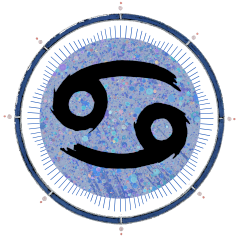Dear Friend and Reader:
When news broke that the National Security Agency was tapping telephones and skimming emails of American citizens, I wondered why people were not more concerned. This was in late 2005, when we also learned the same day that The New York Times had sat on the story for a year. We learned simultaneously what was happening, and that one of the great newspapers of our civilization had covered it up. It was funny, in a sick way.

But the response from nearly everyone but political bloggers seemed placid. Given that people often get upset about violations of their privacy, and don’t like having their picture taken on the street, it seemed strange that the government and its contractors having access to everything we say and write in electronic form did not get people more worked up.
We’re all aware of how much salacious personal material is exchanged on the Internet. Long before sexting (that is, teenagers using their cell phones to snap a nude picture and send it to a friend, who sends it to another friend until everyone is charged with kiddy porn and gets a ride on CNN), people were sending one another naughty pictures, explicit emails and engaging in live video play sessions with long-distance lovers. It all started with AOL, the first bit of the Net to catch on hot. Andy Warhol predicted that some day everyone would be world famous for 15 minutes. He did not predict that anyone who wanted could be a porn star.
The first thing I wondered was: what, exactly, would the United States government do with its massive database of pictures, calls, videos and messages? The obvious thing to do would be to make it available to subscribers. It would be the world’s largest amateur porn site, called porno.gov. We would get a useful entertainment service and an important source of revenue for the government. We could even borrow from the concept of C-SPAN and stream ourselves live.
The second thing that occurred to me is that people were taking the news in stride because they were relieved. As hung up as we are on keeping secrets from friends, parents, children, lovers, the boss and whoever else, I believe living with the tension that we might be revealed is extremely uncomfortable, verging on unbearable. People who live under patriarchy already have a guilty conscience; the fact that we try to hide so much from ourselves and from one another doesn’t help. (In homeopathy, weakness and diseases associated with trying to hide ourselves have a name: the sycotic miasm.)
I think most people want the truth about themselves to be known; we want to be seen for who we are. In the right moment, few things feel better. Even in the wrong moment, it can be amazing; and this is one reason why I think our society is so obsessed with exposing the private lives of famous people. My theory is that the authorities having access to everything we email or say on the phone helped ease peoples’ conscience. “The government,” with its omnipresence and omniscience, was standing in for God. You could text someone privately, and God would know; then it would be okay. I’m not saying people thought this consciously, but it was one of my explanations for why we didn’t seem to care very much.
This looped back into a concept I was first introduced to doing A Course in Miracles, which is that there are no private thoughts. The idea first surfaces in the workbook in Lesson 18: “I am not alone in experiencing the effects of my seeing,” and the next day, “I am not alone in experiencing the effects of my thoughts.” The underlying concept here is that minds are joined; that we are all part of the same thing. The boundary that the ego presents us, of being a self-contained entity ending at the edge of the body and the reach of normal perception, is not strictly true. The ego supports and is indeed based on the illusion of separation, but not the reality. By this time everyone has experienced some form of telepathy, a premonition or having the same dream as a friend. These events shake our faith in the strict rules of space, time and boundaries.
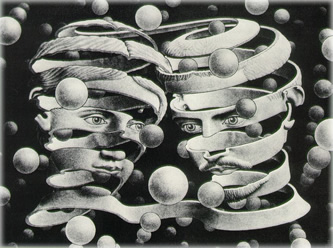
Here is an example that surfaced at the same moment I’m writing this paragraph. Earlier today, I was thinking about a woman in my community who died in 1993, named Liz Grant, leaving behind three young kids. I didn’t know her well, but we had good friends in common, one of whom was a guy named Dean Jones — who I absolutely adore, who I haven’t seen in about 10 years and I had not thought about him in nearly as long. He often took care of Lizzy’s kids. This morning I was wondering about Liz, trying to put together the lines of one of her poems that I used to perform; and wondering where Dean might be and how he was doing. Moments ago, he strolled into Dominick’s Cafe, where I’m writing this article; I could barely believe I was looking at his face. But of course I could. We tend to brush these events off, like when we notice that someone is staring at the back of our head even though we don’t have eyes pointing in that direction. To me this shows that there is either information available coming in through something other than the usual channels; or I have some connection with Dean that extends beyond our normal perception of space and time: beyond the seeming boundaries of the body and of the ego.
Many, many experiences like this, including direct transmission of private information (for example, written in my diary) to others, or people dreaming things I said to other people, has made me question these boundaries and basically accept the idea that there are no private thoughts. What we think of as privacy is an illusion; it is a concept. We often think of it as a legal concept, the “right to privacy,” which in those exact words goes back to a young lawyer named Louis Brandeis, who first introduced the notion in an 1890 Harvard Law Review article co-written with Sam Warren. Nearly a century later, this concept became the foundation for two of the most important Supreme Court decisions in history: Griswald vs. Connecticut, which allows people the right to birth control; and Roe vs. Wade, which allows women the right to choose an abortion.
Then Came the Internet; then Came Facebook
The other day I was driving in my car and my phone rang. My car has a Bluetooth system that makes it possible to converse pretty safely. It was my mother calling. She sounded concerned about something. A relative from my father’s side of the family who she hadn’t seen in about 35 years had called her home. Her husband took the call and deflected it; she had no idea why the guy wanted to talk to her, and she didn’t want to talk to him. Then she called me. I told her everything about him that I knew, reassured her that the guy was basically harmless, and promised to help her sleuth out how exactly he had located her. The fact that he had succeeded in doing so was spooky to her, since she had been living under her second married name since the mid-1980s.
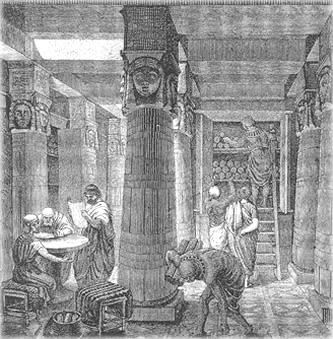
This took about five minutes worth of research. I went from searching her Sicilian maiden name, which is unforgettable like Soprano or Lasagna, to a map to her home in about three easy steps. A Google search of her maiden name led me to her current married name, which in turn pulled up a White Pages listing with her husband’s name, her address and even a map to her apartment. This was using free services available to anyone who can get online. I sent her a series of screen shots going from the first Google search to the map. She thought she was difficult to find.
The Internet emerged right around the same time people were figuring out how psychic we all are. My theory is that the network you are currently using is a model of consciousness based on the truth that minds are joined. We create machines that are capable of things we think we’re incapable of, and suddenly one day we woke up and were surrounded by psychic devices. Besides the Internet itself, personal favorite is this Apple gadget that basically turns your apartment into a little radio station.
Sooner or later, each of us realizes the Internet is not a private place. In fact, it would seem to be entirely transparent. As far as I can tell, the whole concept of privacy is nonexistent online. Some people can keep a very low profile; however, the easiest way to do that seems to be if you died before 1995. One of my early moments of revelation came when I discovered the Google cache system, which saves the most recent copy of webpages that the search engine indexes. I remember the moment sitting at my desk when I realized that I could no longer correct an error or edit a page and be sure that someone cannot find the original. Even if Google updates its cache, the Archive Project might have saved the original, and that is indelible. Lots of old websites are preserved by this project in Alexandria, Egypt, the home of the famous library that burned down around 48 BCE.
Then we learned that search engines were archiving our searches; that email providers were keeping copies of our messages; and that any server (sometimes a dozen or more) transmitting the data across the Internet could keep our “free floating packets of information” on file. Chris Clark, our database programmer (who is in charge of keeping your transactions secure), says that email is laughably easy to hack. Then just this week, we learned that the European Union has required Internet service providers to store information about users for one year.

In the midst of this came Facebook. With the five-year anniversary and the service topping 200 million users, they’ve been in the news a lot lately. The questions all seem to involve privacy. People post things to their Facebook page; their parents or boss or partner sign up and find the page and presto: everyone knows you’re bisexual, got a tattoo or tried E. Of course, people reveal this data voluntarily in Facebook, and as Brandeis and Warren wrote in that 1890 law review article, “The right to privacy ceases upon publication of the facts by the individual, or with his consent.”
Some very powerful astrology led to this, particularly the series of Uranus-Neptune conjunctions in 1993, which were in Capricorn. This represented a breakdown of the traditions, boundaries and compartments represented by Capricorn, which would make room for something else. That something else started to emerge when planets began arriving in Aquarius, beginning with Uranus in 1995. The Internet seemed to descend upon us like an entity taking root on the planet and in consciousness. To me this represents a technological revolution and a social shift. Both Uranus and Aquarius represent groups, and the Net became the biggest group revolution in the history of the world.
Then in 1998 Neptune arrived in Aquarius and the real fun started: the Net began expanding wildly, and social boundaries and structures began melting away. Neptune (among other important themes) is about creating illusions, and suddenly many people had one or more alter egos, leading to today’s standard of having an identity for every occasion. Part of this illusion involves maintaining the notion of privacy in the midst of a total meltdown of privacy.
Nowhere is this contradiction so beautifully displayed as in the Facebook experience. The other day someone sent me an activist video warning about the evils of Facebook, including the fact that they keep all their information. I’ve never liked Facebook, but this had nothing to do with how they keep data. I figure everyone does, and just about everyone online makes and archives numerous backups of their systems. Yet many people seem to be in a tizzy about this: you know, how they type in all their personal details into a public database, complete with photographs and videos, then worry about how other people might find out about it. This, without ever bothering to set the privacy settings that Facebook provides (and which it says that 80% of users ignore).
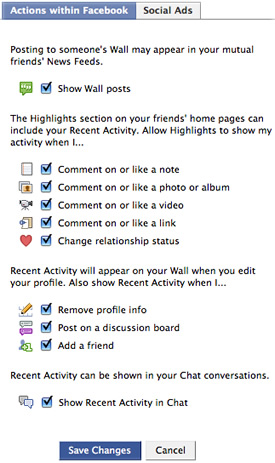
In light of this, I think we need a new concept of privacy. We need to understand that in a world where most of what we say and do ends up in a database, that privacy is merely a scrim; a thin veil. I would also propose that we question why exactly we’re worried that someone might know a certain fact, or why we find it acceptable that some people know certain things about us and unacceptable that others know the same information. I’m not suggesting that everyone should know absolutely everything about us; rater that we question and understand our criteria for how we distribute information. There seem to be two opposing forces in the psyche, one of which wants to lie or give a specific version of events to nearly everyone, and one of which wants to publicize the details of our lives and be totally transparent.
Most people are worried about two things: one is being discriminated against at work. For example, you’re a school teacher, and your supervisor signs up to be your “friend,” and then finds out that you go to swing clubs; and fires you because this supposedly renders you unworthy of teaching math. Sooner or later, the prevailing lesson will be that we all have “private lives,” and that we will all have to deal with this fact about one another. In other words, we’re fast approaching the point where so much will be known about so many people that it will barely matter. To the extent that it does matter, there are many other means of harassing or torturing a person besides using information that they themselves publish to the world.
At the same time, I believe that the deep craving to be known will prevail over the often very uncomfortable desire we have to be private or secretive. These boundaries have been dissolving for a lot longer than we’ve been aware of it, and the Internet is just a reflection of this. It’s a model of the new mental environment. The real change involves a fundamental rearrangement of our ego structures, which is dissolving the concept of separation that is so isolating, debilitating and cumbersome. This change is a response to both incoming energies and an evolutionary step that is calling on us to recognize that we are not separate people with separate interests.
I think that, in the midst of this new reality, we need to question our assumptions that we can do things that people don’t know about, or won’t find out about. Everything from E-ZPass to your credit card statement to your cell phone bill is creating an unprecedented diary of your daily activities. While I think we have a right to not have this information used against us, it’s foolish to think that people or corporate entities aren’t going to find out what we’re up to if they want to. You would be stunned what can come up with a Social Security number and $20 for a database search; for example, when you sold your boat, purchased your condo or moved to Seattle. I don’t suggest you leave your SS card in your wallet, and I suggest you resist every time you’re asked for it. Legally, that number is between you and the Internal Revenue Service — not the people who supply your cafe with broccoli or rent you a storage locker. I am sure that the employment files of most companies are not actually locked.
Facebook: The Perfect Chart
Testing my theory that Facebook is an example of Neptune in Aquarius, I went looking for a chart for the organization. I learned that the site was launched by two Harvard computer science students out of their dorm room in 2004. I also learned that the history of the company begins with a hacking incident: one of the principals of the corporation hacked into the Harvard student ID database and posted student ID card pictures online, creating a contest to see which person was “hotter.” [The incident became the subject of a university judicial procedure, which was eventually dropped.] From there, Facebook spread through the Ivy League universities and then finally ended up the venerable institution that it is today.
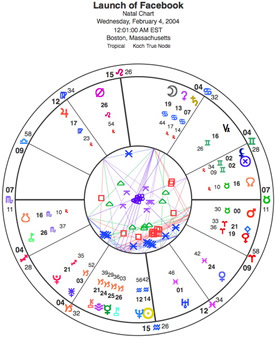 Here is the chart. The time of the launch is not available to me at the moment (I will set out the hounds), so for now I’m using one minute past midnight. Note that Facebook was launched in early February with the Sun at the cross-quarter position called Imbolc — one of the four high sabbats when the Sun is at the middle of the fixed signs (these also include Beltane, Lammas and Sahwen). These dates mark the exact midpoints of the seasons, and because of a mathematical relationship to the first degree of Aries (the Aries Point), they all have that resonance between the public and the private worlds. Everything we say and do on the Internet is a public gesture; this is a living example of Aries Point energy.
Here is the chart. The time of the launch is not available to me at the moment (I will set out the hounds), so for now I’m using one minute past midnight. Note that Facebook was launched in early February with the Sun at the cross-quarter position called Imbolc — one of the four high sabbats when the Sun is at the middle of the fixed signs (these also include Beltane, Lammas and Sahwen). These dates mark the exact midpoints of the seasons, and because of a mathematical relationship to the first degree of Aries (the Aries Point), they all have that resonance between the public and the private worlds. Everything we say and do on the Internet is a public gesture; this is a living example of Aries Point energy.
Next, notice that in this chart, the Sun is conjunct Neptune in Aquarius, with the Sun at 14+ degrees. Interestingly, the domain “facebook.com” was created years earlier, in 1997, with Jupiter in the exact degree that the Sun was in when the site was launched. (The founders purchased the domain for $200,000 after launching their original site.)
The Sun conjunct Neptune personifies the melting boundaries of Neptune in Aquarius; it’s a beautiful image of the persona we present on social networking and personals sites, function like publicity agents; and it emphasizes the blurring of personal and collective boundaries that is so vividly developing under Neptune in this sign, which I will come back to in a moment. Note also that Facebook is driven by conformity. Most people would not get involved if everyone else was not doing it.
The Moon is in Cancer, opposing Chiron in Capricorn. The Cancer Moon gives us that cozy, homey feeling. The opposition to Chiron pierces the boundary and sanctity of the home. Moon to Chiron can represent hurt feelings; it can represent hypersensitivity; it’s associated with the pain of not getting our emotional needs met, or the vulnerability we must embrace to do so; and it has that “no illusions” feeling that can confront us with the truth, regardless of how it feels.
The most adorable feature in this chart is that Mercury is conjunct Nessus. Mercury will be a factor anywhere that communication or media are involved. Nessus has two main levels, the first of which is structural: it represents any situation where karma goes in a long circle and returns to where it starts. It’s also about situations where there is potential abuse or potentially inappropriate contact, particularly of trust where sexual encounters are concerned. With Mercury, this would mean information about sexual and relational encounters. Built right into the Facebook chart is the crisis over what we do with information, and since Capricorn is involved, this includes personal, corporate and governmental involvement.
Vesta is close by, which to me represents a sacrifice, in one aspect; and the archetype of the sacred whore, in another. We are “putting ourselves out there,” but why exactly are we doing it? Does this medium give us contact, or the illusion of contact?
As we head for a triple conjunction of Jupiter, Chiron and Neptune in Aquarius next month — the central astrology of 2009, and one of the peak experiences of the decade — we will surely be making some discoveries about this.
Yours & truly,
![]()
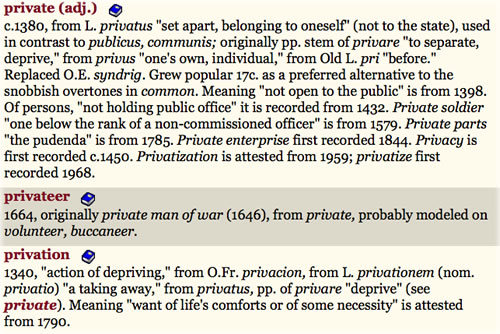
Nearly 28,000 homeless after Italian quake
Mars conjunct Uranus is earthquake weather, and there was a notable one this week, in an italian city dating back to 1254. Rescue efforts continued among aftershocks in the Abruzzo region around L’Aquila, Italy. The death toll from Monday’s earthquake rose to 260, as reported in The New York Times. The earthquake struck at about 3:30 a.m. local time and registered 6.3 on the Richter scale; many buildings in the tightly packed city and surrounding villages were destroyed during the quake and subsequent aftershocks.
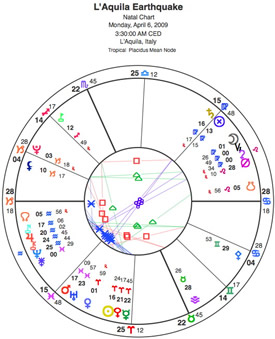 The chart has 28+ degrees of Capricorn rising, which feels like an unstable structure. The ruler of Capricorn, Saturn, is in the 8th house, which is often about the theme of death. In this case, the cause of death was the structures that people live in. Nearly every building in the city was damaged or destroyed by the quake.
The chart has 28+ degrees of Capricorn rising, which feels like an unstable structure. The ruler of Capricorn, Saturn, is in the 8th house, which is often about the theme of death. In this case, the cause of death was the structures that people live in. Nearly every building in the city was damaged or destroyed by the quake.
Italian Prime Minister Silvio Burlusconi told news agencies that some 17,700 people were homeless and living in temporary shelters such as tents, while another 10,000 had been put up in hotels in nearby coastal towns. Meanwhile, Bishop Guiseppe Molinari of the Roman Catholic Church was overseeing preparations for a funeral service for all the quake’s victims, to be held this Friday.
By midweek, few survivors were being found; officials said rescue efforts would continue until Easter Sunday.
The city of L’Aquila is located in central Italy, northwest of the capital Rome, in the Apennine Mountains. The capital of the Abruzzo region, its population is about 73,000, though that can be swollen to 100,000 any given day by tourists, students, and workers. The region is known for its earthquakes, and that has defined the history of the Medieval city.
Wikipedia tells us that the city “was stricken by earthquakes on December 3, 1315, January 22, 1349, in 1452, 1501, 1646, 1703, [and] 1706.” There had been a series of minor tremors since the start of this year. This was the deadliest quake in Italy since 1980.
Anti-Globalization: An Activist Heritage
One sure way to get protesters out into the streets is when there’s another globalization meeting. Last week it was the G20, and the plutocrats got together just as Mercury was conjunct the Sun, and Venus was backing into a square with Pluto. This translates to big news in a conflict over values. Yet the Venus-Pluto square raises the question, what is important to us as individuals? And how does this affect us all?
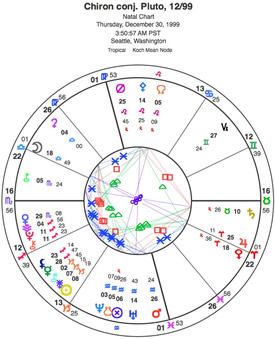 The international Group of 20 (G20) summit of developed and emerging nations was held in London, and by its second day on Tuesday, March 31, police had already arrested 111 protesters. This coincided with Barack Obama’s first official state visit to the England and Europe. Later in the visit, he apologized for the United States’ recent arrogance (without saying so, referencing the Bush administration) and called on Europeans to give up their anti-American attitude.
The international Group of 20 (G20) summit of developed and emerging nations was held in London, and by its second day on Tuesday, March 31, police had already arrested 111 protesters. This coincided with Barack Obama’s first official state visit to the England and Europe. Later in the visit, he apologized for the United States’ recent arrogance (without saying so, referencing the Bush administration) and called on Europeans to give up their anti-American attitude.
In the past decade, an impressive international activist movement has emerged around these global summits, which began with the WTO protests in Seattle in the autumn of 1999. The “Battle in Seattle” coincided with the watershed conjunction of Chiron and Pluto in early Sagittarius. On Monday, the Sun and Mercury were exactly trine the position of the 1999 conjunction, Mars was square the position of that conjunction, and the Moon was opposing it. So the chart for the latest round of protests aligns beautifully with the one that started the movement. This is also the chart for the turn of the millennium and the Y2K non-incident.
While many protesters had objected to last week’s summit with vandalism and violence, others, did so by taking off their pants. (Be aware, this link is not safe for work.) Is there anything about the chart that says naked? Well, Aries does: they are the little kids that like to dance naked on the coffee table. Some finally do give up this activity as an adult, but maybe they are the ones who show up at protests and undress there.
By the close of the session on April 2, participants had pledged $1.1 trillion dollars “to revive the world economy, a joint call to fight protectionism, and concrete actions to tighten banking regulations,” China’s Xinhua news agency reported.
So, why all the fuss? Many people believe these conferences — this was the second G20 meeting — serve only to promote the interests of wealthy nations and big businesses at the expense of: you name it: developing nations, the environment, the poor, the hungry, small businesses, Iraq, Afghanistan, social programs and so on.
Not everyone raising objections at the G20 is on the street. French President Nicolas Sarkozy took the opportunity to lambaste the Anglo-Saxon Model, a reference to “survival of the fittest” capitalism that European nations say Britain and America have promoted to the detriment of other nations.
While there were violent clashes with police, it seems that most of the protests were peaceful, leading Business Week to declare them “More fun than violent.” In activism as in everything else, if you’re not having fun, you’re not doing it right.

Weekly Horoscope for Friday, April 10, 2009, #761 – By ERIC FRANCIS
 Aries (March 20-April 19)
Aries (March 20-April 19)
You may feel like the world has more influence on you than you have on the world. Usually this is true. Yet you may not have a clear sense of how you can direct the flow of events around you, or how you are impacting the hearts and minds of those close to you. Venus retrograde in your sign, your consistent questioning of your self-perception, is having more of an influence than you think. If anyone notices the process you are in they can get drawn into the vortex. They’re not necessarily comfortable with the feeling; likewise you may notice a strange edgy quality in the back of your mind that peaks over the next 24 hours. Pay attention to what comes up for you. The chaos and the questions are fertile.
 Taurus (April 19- May 20)
Taurus (April 19- May 20)
For the next week or so, you’re in an unusual position to experience some aspect of your future self. Or rather, your astrology says that your mind and other energy bodies are in a perspective that will allow you to envision your future. What you need to know is that this is an inside-out visioning process. It’s more about who you are becoming than what you want to do, though the two are related. There is also something here about breaking free of a self-concept that has done little other than box you into a perception of yourself that is firmly rooted in the past, and which is difficult to see. You seemed destined to finally witness what this has done to you, but I suggest you quickly move past that and embrace what is possible.
 Gemini (May 20- June 21)
Gemini (May 20- June 21)
Mercury has just entered the angle of your chart where your deepest visions are kept. Vesta is about to leave that secret room and enter your birth sign. The fourth asteroid, Vesta is about the ability to offer yourself to others without your own needs getting in the way. While most astrologers use Vesta to understand the issue of “work as a substitute for relationships,” in my astrology Vesta is about devotion and in particular about offering sexual service to others. What often comes up is the idea of sacrifice. We have mastered the energy of this meaningful little planet when we can give of ourselves, and hold space for others to be themselves, with no sense of sacrifice. This is easier said than done, but it’s an interesting and beautiful journey if you choose to take it.
 Cancer (June 21- July 22)
Cancer (June 21- July 22)
Significant developments are brewing in what we westerners call your ‘professional life’, which actually translates to your most meaningful mission, and I would point out how vital this is to your sense of grounding, identity and self-worth. Things seem to be taking a long time, I know; and lately you may be feeling less certain than ever that there is a correct path. The astrology suggests strongly that you need to be visioning your future. You can do this in your mind; but something tangible, such as writing, drawing or a scrapbook, would be especially valuable. To get visioning going, it would help to use a visual tool, so you can see what you want and what you are trying to create.
 Leo (July 22- Aug. 23)
Leo (July 22- Aug. 23)
You are about to experience the benefits of keeping your beliefs flexible. You may have an opportunity to explore a situation where two opposites both seem true, but actually it’s more like a situation where every possibility is valid. Some people will undoubtedly consider this confusing because it challenges certain key values they hold (such as fixed ideas about right and wrong). If you pay attention you will see how this condition grants you exceptional freedom, particularly from the values of others. At this point in history, nobody can afford to be too attached to any one viewpoint, and the game of ‘either this, or that’ is getting extremely old. I suggest you remain open to the many potentials that exist, even if you cannot see them and even if nobody else believes they are there.
 Virgo (Aug. 23- Sep. 22)
Virgo (Aug. 23- Sep. 22)
Once I had a cat named William who walked through a solid door. We were playing the ‘do you want to be in or out’ game that is a favorite of cats everywhere. I closed the door and he ended up on the wrong side; that is, opposite where I had just seen him. To this day I wonder whether this was some kind of David Cooperfield illusion, kitty-styled. You can look at the movements in your relationships in a similar light this week. Someone you thought was on the outside is about to end up on the inside, even though you thought the door was already closed. From there, anything is possible, as long as you notice what just happened.
 Libra (Sep. 22 – Oct. 23)
Libra (Sep. 22 – Oct. 23)
So many matters involved with emotional healing come up in our relationships you would think we would get the message. Which message would that be? It could be that love brings up everything unlike itself. Or it could be that we make people out to be who they become in our relationships with them. This is a central message of relationships: we tend to see our own perception, and this counts for the ‘negative’ and ‘positive’ aspects of who a person is; which is in turn based on either what we want, or our experience of the past. You’ve reached a point where you can see the effects of your projections, and give reality a moment to be itself. In this way, you will discover a new depth of who you are.
 Scorpio (Oct. 23- Nov. 22)
Scorpio (Oct. 23- Nov. 22)
You are starting to blur the line between work and play, which is precisely what you need to do if you want to be happy, much less be enlightened. To ‘play at work’ usually gets chalked up to goofing off, but your current work assignments suggest strongly that you need to bring an element of exploration usually associated with taking your mind off of responsibility. What you are looking for is a way to let in your imagination, which is abundantly active at the moment and will be getting more fiery as the next week progresses. The last thing you can afford is frustration, so you need to feed yourself with pleasure and sensuality. The results will speak for themselves.
 Sagittarius (Nov. 22 – Dec. 22)
Sagittarius (Nov. 22 – Dec. 22)
You generally follow your instincts; it’s now time to follow your intuition. This is a difference not often enough made. Among the ways we could slice this apple would be to say that instincts are more closely connected to the animal nature (predatory activity, survival) and intuition is more closely associated with the best elements of human nature. Intuition is subtler. It’s less like a tug and more like being gently presented with an idea you suspect might work. As the next few weeks develop, you will also be presented with opportunities to collaborate that you will suspect might work, even though you know of no special reason why that might be. Remember one word: affinity. It’s subtle, and sublime.
 Capricorn (Dec. 22- Jan. 20)
Capricorn (Dec. 22- Jan. 20)
The problem with emotions is how self-centered they can lead us to be. Feelings are a more relational way to experience existence; they imply communication rather than reacting. The other problem with emotions is that they can seize control of consciousness, leading us to believe that they are the only possibility capable of existing right now. Feelings tend to offer us options. These two qualities are going to come extremely close to seeming like the same thing over the next couple of weeks. I suggest you keep your inner eyes open for what you are experiencing at all times. The distinctions are important, and there will be several key turning points in your relationships that hinge on your correct perception of your experiences.
 Aquarius (Jan. 20- Feb. 19)
Aquarius (Jan. 20- Feb. 19)
Pattern recognition is one of the most important mental skills that a human is capable of. At the moment, you’ve got it. There are patterns everywhere: especially in what seems random, and especially where you observe problems that seem like they cannot be solved. This is always a matter of viewpoint, and people tend to cling to fixed perspectives, mainly because they believe they will create predictability. This is just the thing to let go of right now, because the best ideas and the best solutions will manifest in an unpredictable way. At the moment, this pertains to one particular financial situation, yet when you see this method of problem solving actually work, you will move onto more challenging issues.
 Pisces (Feb. 19- March 20)
Pisces (Feb. 19- March 20)
For an extraordinary 10 days, Venus is going to perch on the edge of your sign; Mars will form a conjunction to Uranus; and then make a conjunction to Venus. There is a lot going on inside this astrology, and inside you, yet what I see as the most vivid theme is the gift of working through a sexual issue of some kind. It’s like a question you’ve been asking for a long time is finally answered with an actual experience that demonstrates the veracity of what you perceive. Part of this — the most important part — involves an aspect of gender identity. You seem to be squirming around looking for the place where your soul fits into your body and where your body fits into the world. Relax for a moment, set aside your agenda and you will discover you actually have a fulfilling place to be.



